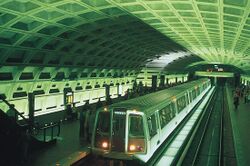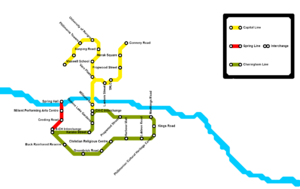New Phork Underground
This article is incomplete because it is pending further input from participants, or it is a work-in-progress by one author. Please comment on this article's talk page to share your input, comments and questions. Note: To contribute to this article, you may need to seek help from the author(s) of this page. |
 A train on the Reeds Line | |
| Overview | |
|---|---|
| Locale | New Phork, Philimania |
| Transit type | Rapid transit |
| Number of lines | 9 |
| Number of stations | 63 |
| Daily ridership | 1.757 million (2019) |
| Website | www.npu.com.ph |
| Operation | |
| Began operation | 4 August 1972 (New Phork Underground opened) |
| Operator(s) | New Phork Underground Corporation |
| Technical | |
| System length | 754.3 km (468.7 mi) |
| Track gauge | 1,435 mm (4 ft 81⁄2 in) (1863–pres.) |
| Electrification | 630 and 750 V DC fourth rail |
| Average speed | 33 km/h (21 mph) |
The New Phork Underground (also known simply as the Underground) is a rapid transit system serving New Phork in Philimania.
Opened in August 1972, it is the first line to operate underground electric traction trains in South America. The network has expanded to 9 lines, and in 2019 was used for 641.305 million passenger journeys. The 9 lines collectively handle up to 1.757 million bpassenger journeys a day.
Construction of the New Phork Underground was prompted by a study, released in 1970, commissioned by The Philimanian Legislative Council to find solutions to the increasing road congestion problem caused by the city's fast-growing poppulation. Construction started soon after the release of the study, and the first line opened in 1972. The New Phork Underground was immediately popular with residents of New Phork; as a result, subsequent lines have been built to cover more district. There are continual debates regarding how and where to expand the network.
History
Initial proposals
During the early 1960s, The Philimanian Legislative Council saw a need to accommodate increasing road traffic as New Phork's population grew rapidly. In 1963, Philimanian transportation consultants Norland, Rox, James & Associates were appointed to study the transportation system of New Phork. On 1 September 1964, the consultants submitted the New Phork Mass Transport Study to the government, which recommended the construction of a rapid transit rail system in New Phork. The study suggested that three rail lines be developed in six stages, with a completion date set between December 1970 and December 1978. Detailed locations of lines and stations were presented in the study. These three lines were the Spring Line (from the Spring-Charingham Interchange to Spring Hall), Capital Line (from Maxwell School to Connery Road or the Milieunt Ita), and Charingham Line (a circular line that goes around the district).
In 1965, the Philimanian government authorised construction of the Initial System.
Initial System
Construction of the Initial System commenced in October 1965. The Capital Line was completed on 1 September 1970. The first train drivers were trained on the London Underground. The Spring and Charingham Line opened in January 1971 and November 1971 respectively. The first lines was designed by a consortium of consultants led by Smith and Partners. On later extensions to the railway the stations were designed under the supervision of Gorden Wasp, the chief architect at the New Phork Underground Corporation.
The Initial System was opened on 12 January 1972 by Mayor Losan MacLeon. Trains were gradually extended to seven cars to accommodate an increase in passenger numbers.
Line extensions
The government approved construction of the Oakley Line in 1977, then known as the Oakley Extension, and works commenced in February 1978. The project added a section to the system, from Oakley High to the Spring-Oakley Interchange, which was a new station added to the network to the Spring Line. The Oakley Line started service on 1 August 1982 with a total cost of construction of P$1.6 billion (US$2.425 billion).
in 1980, the government grants the construction of a large project to expand the New Phork Underground to the eastern disticts, Gapan, Grunning, and North New Phork District. Construction commenced in March 1981. On 17 May 1986, the 3 lines which were the Gapan Line, Grunning Line, and the North Line was opened. Furthermore, each train was extended to nine cars.
